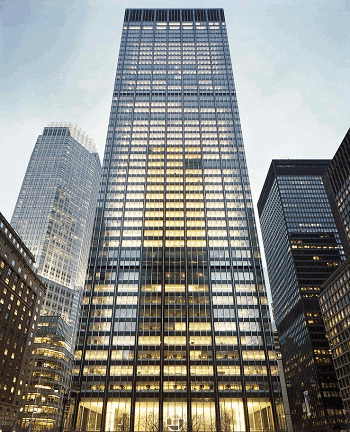Fosun International Ltd became the latest Chinese company to acquire a US trophy asset last week when it agreed to purchase 1 Chase Manhattan Plaza from JP Morgan Chase for US$725 million.
With the acquisition the closely held Shanghai firm now holds the most expensive real estate trophy asset of any Chinese firm entering the US market, overshadowing a number of potentially larger, but as yet unfulfilled deals announced by rival firms in recent months.
The Chase Manhattan deal comes in the wake of a number of high profile acquisitions of US properties by Chinese firms as China’s local heroes attempt to move onto the world stage. According to data from property information provider, Real Capital Analytics, Fosun’s purchase is the biggest of an entire building in New York or anywhere in the US by a Chinese buyer.
In a statement filed with Hong Kong’s stock exchange, Fosun disclosed the acquisition of the 60-storey, 204,000 square metre tower from JP Morgan Chase for $725 million. Up until the acquisition, the building had been partially occupied by approximately 4000 JP Morgan Chase employees.
Just last week, Fosun had announced plans for developing a RMB 10 billion resort in China’s Hainan province.
Fosun Joins a Wave of Chinese Investment in the US
Just two weeks ago, Greenland Group of Shanghai, which compete’s with Fosun subsidiary Forte in China’s real estate markets, announced that it was taking a 70 percent stake in the Atlantic Yards development in Brooklyn, a project which has been said to require investment of up to US$4 billion by the time that it is completed in 2016.
Greenland Group, also acquired the 25,600 square metre Metropolis office project in Los Angeles during July, a project which has the potential to involve US$1 billion in investment. However, desite the big headline investment numbers for Greenland’s acquisitions, both of these are development projects which involve smaller investments up front, and the potential for investing larger amounts in the future.
Also earlier this year, Dalian Wanda’s flamboyant boss, Wang Jianlin announced his firm’s plans to develop a $1 billion hotel in New York, as part of a plan to start a new global hotel chain.
Acquiring Existing Assets, Not Developing New Projects
Fosun’s deal with JP Morgan is a straight acquisition of an existing property and involves a more immediate commitment of funding. Before the purchase of the Chase Manhattan building the highest profile acquistion of an existing New York real estate investment by a Chinese investor this year had been SOHO China CEO Zhang Xin’s participation in a multi-party consortium which took a 40 percent interest in the US3.4 billion GM building in Manhattan.
The sellers in both the GM Building and the Chase Manhattan transactions were represented by CBRE. Speaking to Bloomberg in New York, Darcy Stacom, vice chairman at CBRE said, “We likened it (1 Chase Manhattan Plaza) in our marketing materials to the General Motors Building of downtown.”
According to Real Capital Analytics, even before the Chase Manhattan Plaza deal was announced, China already led all foreign countries in New York property investment this year with $1.37 billion of acquisitions.
Chinese Companies Competing to Be Global
While the wave of investments by Chinese firms is driven by a number of factors, including policy restrictions in their domestic markets and an interest in diversifying their portfolios, there is also an aura of one-upmanship surrounding the almost weekly announcements of overseas investment megadeals by Chinese firms.
Developers such as SOHO, Dalian Wanda, Fosun (through it’s Forte Real Estate subsidiary) and Greenland Group have been fierce rivals in China’s domestic real estate market, and now they all appear eager for recognition on the global stage.
Like star performers in any secondary market, there is a need to find out if they can compete at a higher level, and for real estate just like arts, there is no bigger stage than New York.
Avoiding the Mistakes of the Japanese
A generation ago, Japanese investors were snatching up buildings in New York, which they saw as cheap at the time, and also viewed as a statement of their arrival as world-class players. The most famous of these acquisitions was Mitsubishi Estates’ purchase of the Rockefeller Center in Manhattan in 1989.
However, some estimates reckon that Japanese companies lost more than $25 billion on US real estate holdings from 1985 to 1995, and Mitsubishi Estates’ famously went bankrupt.
Let’s hope that the investments by Fosun and its rivals have a happier New York story than the one written by the Japanese.

[…] Chinese investors are looking abroad, too. There have been numerous reports of a wave of record-setting investments by Chinese buyers in America. Fosun International made a […]